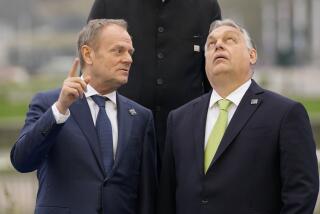Hungary zigzags when it comes to Russia
Reporting from Budapest, Hungary — There’s a museum in Budapest called the House of Terror. It has a metal awning with the word “terror” carved out of it, and when the sun is high, the people below step on terror, pass through terror, because the shadow of the word hangs in the air before it hits the ground.
Twenty years after the fall of the Berlin Wall signaled the end of Soviet dominance in Hungary, Russia’s ghosts linger in a fledgling political system, and its oil and gas muscle spooks the Hungarian government. Russia exists today as an anxiety; to a rising generation, an abstraction. And yet, to some -- an opportunity.
The fall of the Soviet empire freed Hungary to join the North Atlantic Treaty Organization and European Union and reinvent itself, along with other parts of the surrounding region, as the eastern edge of a unified Europe.
As an increasingly assertive Russia has capitalized on its oil and gas wealth, some former satellites have remained hostile and frightened; others have opted for greater cooperation with Moscow.
Hungary’s dealings have been more ambiguous. Business and politics are typified by mixed impulses -- tentative steps together, sudden flashes of vulnerability and push-back.
Moscow is there, after all, and must be dealt with. Moreover, Russia is rich, and many Hungarians are bitter and disillusioned to realize that EU membership has failed to deliver them into wealth.
But there is the problem of the past in a country where Soviet tanks put a bloody end to a 1956 uprising -- the paranoia left over, but also a general unease about thinking too hard about the decades of quiet collusion that followed.
“Everything is mellowed and blurred. The past is defined as bad, but it’s never engaged in a social discussion,” said Gergely Romsics of the Hungarian Institute of International Affairs. “People don’t want to face the last 40 years, the little compromises they made with power. What happens with Russia in post-1989 Hungary is forgetting.”
Walk through the door of the House of Terror and you are confronted by a star and the arrow-tipped cross of the pro-Nazi party that surged to power in the 1940s. The pair of symbols conjure the history of this building, which housed the Arrow Cross party before being seized by the Communists and converted to a secret police headquarters.
It’s also the kind of thing that infuriates many Russians -- the conflation of Soviet and fascist occupation.
Walk a little deeper and you will find a television set flashing the same pictures, over and over again.
“Sixteen-, 18-year-old kids whose thinking was different, and they sent for the hangman, the executioner,” weeps a man in black and white. “This was their socialism.”
This is where the museum of history meets contemporary politics. Critics say the museum was opened as a political ploy on the part of the conservative party.
Socialists, who believe the museum was created to undermine their popular appeal, point out that the exhibits are weighted heavily on the side of recapturing and condemning the brutality of Soviet repression.
The museum’s director brushed aside the complaint. Budapest already had a Holocaust center, she pointed out, but was lacking any public dialogue about decades of socialism.
“This created a big discussion about the past, which is good,” Maria Schmidt said. “We had these very, very hot discussions.”
Schmidt is a former advisor to Viktor Orban, the head of Hungary’s most powerful conservative party, Fidesz. As a young man, Orban electrified the country during the heavily symbolic 1989 reburial of former Prime Minister Imre Nagy, who had stood up to the Soviets in 1956 and been executed for his trouble.
The day Nagy was laid to rest, Orban stole the show with an audacious call for the Soviets to leave the country. He would go on to serve as prime minister from 1998 to 2002.
“It was very brave, and people were horrified,” said Tibor Dessewffy, director of Budapest’s socialist-linked Demos think tank. “With that single performance, Orban divided the country in two.”
Today, Orban preaches that Hungary must avoid becoming the “happiest barrack of Gazprom,” the Russian gas giant.
He is invoking the much- repeated line that Hungary, with its relatively liberal brand of socialism, was the happiest barrack of the Soviet bloc.
This is how Russia flickers through domestic politics, used as a bludgeon between the conservatives, who have found themselves relegated to the opposition, and the leftists, in power but beleaguered.
Ivan Boytsov is nostalgic for the Hungary he discovered in 1978, when he traveled the countryside as a student at St. Petersburg State University. As an administrator at the Russian Culture Center in Budapest, he is here championing the study of Russian language and culture, and trying to improve what he regards as deeply flawed perceptions.
“If there’s any information on TV, it will be about Russian expansionism,” he said. “I can’t remember any coverage of Russian sports, science or accomplishments.”
Mandatory under Soviet occupation, the Russian-language curriculum vanished from schools after the fall of the Berlin Wall, replaced by German, French and -- most of all -- English.
Today, driven by curiosity and ambition, interest in Russian studies is creeping back, school by school. The rekindling of interest comes despite school administrators who keenly recall the old days, Boytsov says.
“Students and parents want it, but the administrators make it impossible,” he said. “They say it’s of no use to students to speak Russian.”
Still, students are signing up for his courses by the hundreds. Almost all of them have an eye on doing business in Russia, lured by tales of booming wealth.
Hungarians who fret over resurgent Russian influence see the return of eastern power not in tanks, but in -- often cloudy -- business transactions.
“Russia is a threat to its immediate neighbors, whether or not they see it,” said Istvan Gyarmati, a longtime ambassador and president of the International Center for Democratic Transition in Budapest. “Oil and gas is a weapon, and they use it.”
This year, an opaque Russian energy firm with close links to the Kremlin bought a 20% stake in the Hungarian oil and gas company MOL. Meanwhile, the national airline, Malev, has fallen under the management of Aeroflot, Russia’s national airline.
There are two ways to look at this: Russia is a cash-rich country full of people looking for investment opportunities in nearby markets. Or, Russia is a sinister force spending cash in its effort to regain influence in the former Soviet bloc.
Some countries have aggressively blocked Russian investors. But Hungary has tried to hedge its bets.
In a Europe split by gas wars, Hungary supports both South Stream, a pipeline backed by Russian Prime Minister Vladimir Putin that would deliver Russian gas under the Black Sea to Europe, and Nabucco, a rival, U.S.-backed project that would carry Central Asian gas to Europe through Turkey, bypassing Russia.
The idea is to stay in the middle, to give it a little time, to try to turn a profit.
“It’s good to have Russia as an ally, but it’s good to have them far,” said Zoltan Kiszelly, a political scientist in Budapest. “You have to think this way when you’re a small country.”
More to Read
Sign up for Essential California
The most important California stories and recommendations in your inbox every morning.
You may occasionally receive promotional content from the Los Angeles Times.










